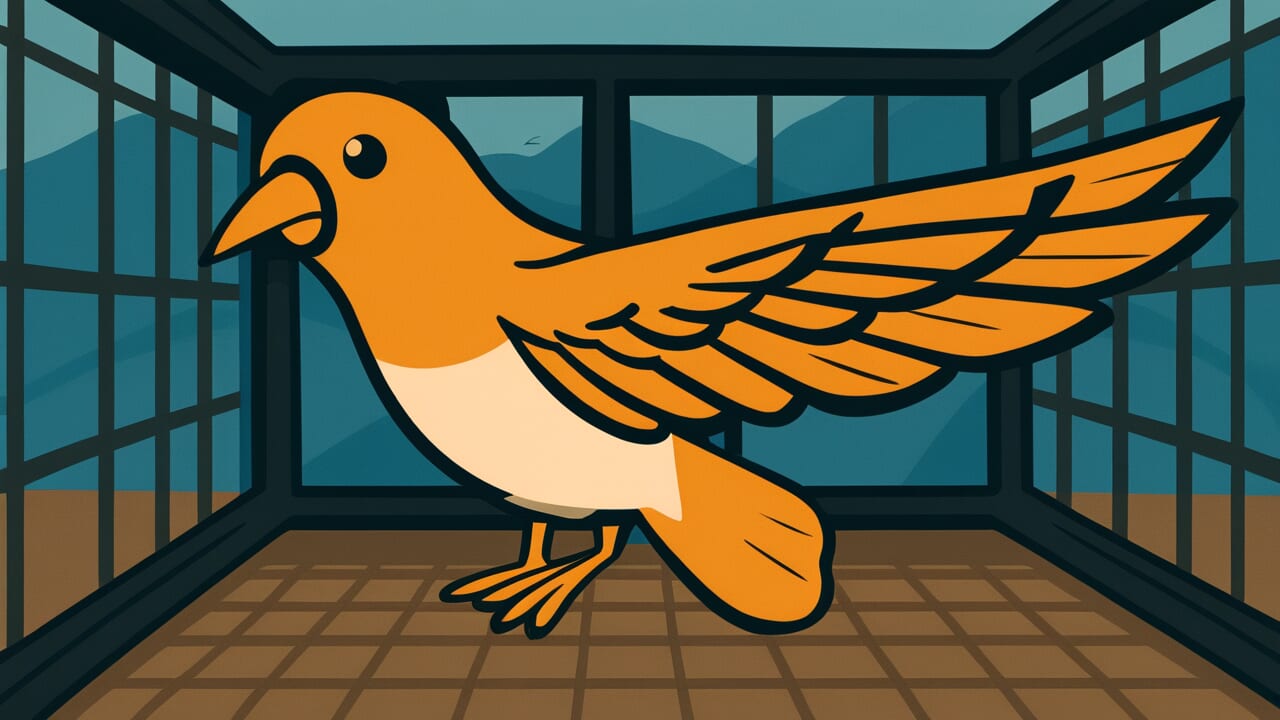How to Read “A caged bird does not forget how to fly”
Tori torawarete tobu koto wo wasurezu
Meaning of “A caged bird does not forget how to fly”
This proverb means that even when people face difficult situations or restrictions, they don’t lose their original aspirations, abilities, or true selves.
Just as a bird placed in a cage doesn’t forget its instinct to fly, humans can also preserve their dreams, goals, and essential strengths no matter how harsh their environment becomes.
This proverb is used to encourage people facing adversity. It also praises those who keep looking forward without giving up in difficult situations.
It expresses how people maintain their inner strength even when temporarily deprived of freedom or unable to act as they wish.
Today, it’s used to show that a person’s essential value and abilities don’t change. This applies even when social constraints, economic hardships, illness, or injury limit their activities.
Origin and Etymology
No clear records remain about the exact origin of this proverb. However, its structure suggests possible influence from classical Chinese thought.
Connections are sometimes noted to Confucian and Taoist philosophies, which emphasize human nature and innate qualities.
Birds have been treated as symbols of freedom since ancient times. Their ability to fly freely through the sky represents an ideal of unrestrained living across many cultures.
Meanwhile, being “caged” represents not just physical confinement but also social constraints and difficult circumstances.
The expression “does not forget” is particularly interesting. It doesn’t simply mean remembering something.
Rather, it suggests that essential qualities and abilities engraved deep in the heart never disappear.
A bird’s innate ability to fly isn’t lost even when confined in a cage. This natural principle is overlaid onto human spirituality, creating the proverb’s deep insight.
In Japan, from the Edo period onward, this saying was used among samurai and scholars. It explained the proper mindset during adversity.
The expression was accepted because it matched Japanese spirituality, which values not losing sight of one’s aspirations and original strength in difficult situations.
Usage Examples
- Despite years of battling illness, he embodies “A caged bird does not forget how to fly”—his passion for research hasn’t diminished at all
- Even after being unfairly treated and demoted, true to “A caged bird does not forget how to fly,” she never compromised her beliefs
Universal Wisdom
This proverb speaks to a deep truth about human dignity. Each of us is born with unique value and potential.
These qualities don’t simply vanish because of external circumstances.
Why has this proverb been passed down through generations? It’s because humans are beings who always live within some form of constraint.
Social norms, economic limitations, physical boundaries, relationships with others—we cannot live in a state of complete freedom.
Yet humans also possess an inner world that transcends external restraints. There exists a freedom of thought and spirit that no one can take away.
This proverb also answers the question of what true strength is. It’s not forcefully breaking through constraints.
Rather, it’s the mental toughness to never lose sight of your essence regardless of circumstances.
Just as a bird maintains its flying instinct even in a cage, humans can have the strength to remember who they are, especially in difficult situations.
Our ancestors understood the importance of maintaining humanity when facing life’s unavoidable difficulties and constraints.
Even when you can’t change external circumstances, you can keep your inner flame burning. This proverb quietly yet powerfully teaches that this is humanity’s most beautiful strength.
When AI Hears This
A bird’s flying motion is encoded as “procedural memory” in brain regions called the cerebellum and basal ganglia.
This memory type has a remarkable characteristic—once acquired, it’s extremely resistant to erasure. It’s the same mechanism that lets you remember how to ride a bicycle after decades.
What’s fascinating is how robust this motor memory is against environmental changes.
Neuroscience research shows that neural circuits supporting motor skills are physically preserved as synaptic connection patterns. This happens even when the action can’t be performed for extended periods.
In other words, a caged bird that can’t actually fly still maintains the neural circuits necessary for flight in its brain.
Even more noteworthy is that this motor memory isn’t just a skill. It’s deeply connected to the organism’s “self-recognition.”
In a bird’s brain, flying isn’t merely a means of transportation. It’s incorporated into neural networks as a fundamental element defining what they are.
Even when the environment is restricted, this neural pattern isn’t erased. Rather, it continues to activate in a suppressed state.
This applies to humans too. Our essential abilities and inclinations exist as physical brain structures. Temporary environmental constraints don’t erase them.
This proverb suggests that identity isn’t an abstract concept. It’s actually a biological reality in the form of neural circuits.
Lessons for Today
This proverb teaches us the importance of carefully protecting the core parts of ourselves.
In modern society, facing various constraints and difficulties is unavoidable. Economic problems, relationship stress, career stagnation, health challenges—in such situations, we easily lose sight of ourselves.
However, this proverb speaks to us gently yet powerfully. No matter what situation you’re in now, your essential value doesn’t change.
What matters is not letting temporary constraints bind your heart. Even if there are things you can’t do now, your talents, passions, dreams, and goals continue living in your heart.
Specifically, even in difficult situations, don’t forget what you truly value. Even if you can’t realize it immediately, keep that feeling in your heart.
Continue expressing your true self, even in small ways. By doing so, when circumstances change, you can spread your wings again.
The light inside you cannot be extinguished by anyone. Continuing to believe in it becomes your hope for tomorrow.



Comments